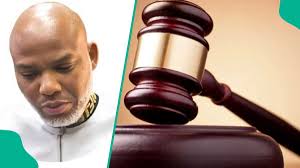
Daniel Otera
The courtroom in Abuja was charged with tension on Friday as Justice James Omotosho delivered a ruling that could significantly impact the detained IPOB leader, Nnamdi Kanu. In a dramatic turn, the Federal High Court directed the Nigerian Medical Association (NMA) to establish a medical panel within eight days to evaluate the IPOB leader’s health, determining whether he should be transferred to the National Hospital for urgent treatment.
Kanu has remained in the custody of the Department of State Services (DSS) since his controversial return to Nigeria in 2021 to face terrorism-related charges. Conflicting medical opinions have escalated the stakes: the DSS medical team, led by Dr. Mohammed Nasir, argued that their facilities could adequately manage Kanu’s condition.
DSS lead counsel, Asiwaju Adegboyega Awomolo, emphasized that transferring the IPOB leader could disrupt hospital services and pose security risks, while still allowing him access to independent medical experts within DSS premises.
Yet Kanu’s private medical consultants, headed by Professor Martin Aghaji, a retired University of Nigeria, Nsukka medicine professor, painted a far more urgent picture. They contended that the deteriorating health of the IPOB leader required immediate transfer to the National Hospital, potentially even abroad.
The DSS dismissed this assessment as “exaggerated and suspicious,” questioning the unilateral adjustment of Kanu’s medications without consultation with DSS doctors who had treated him for four years.
Justice Omotosho’s ruling instructs the NMA panel to examine DSS hospital facilities while allowing the use of any medical center in Nigeria for evaluation. The committee must comprise eight to ten members, including cardiology and neurology specialists, with the Chief Medical Director of the National Hospital serving as a mandatory member.
Kanu’s lead counsel, Dr. Onyechi Ikpeazu, welcomed the court’s order, stressing that proper medical care is essential for justice. “It is in the interest of justice that the IPOB leader remains alive to face the terrorism charges against him,” he said.
The coming days, as the NMA conducts its assessment, could prove decisive for Kanu’s survival and set a critical precedent for the treatment of detainees in Nigeria.
